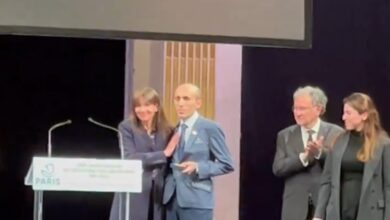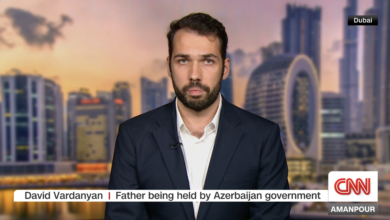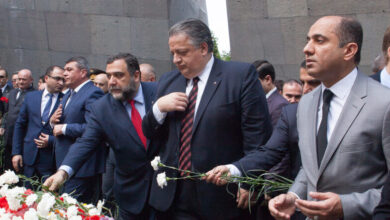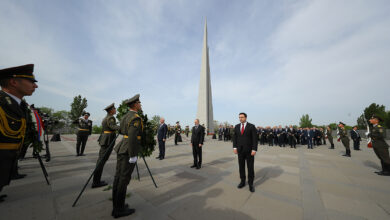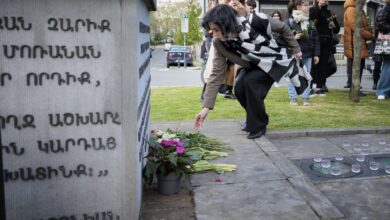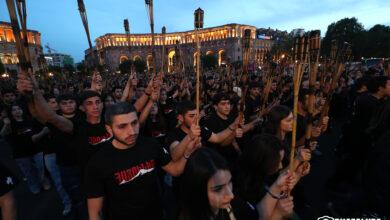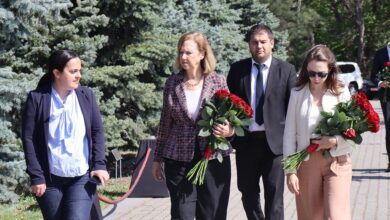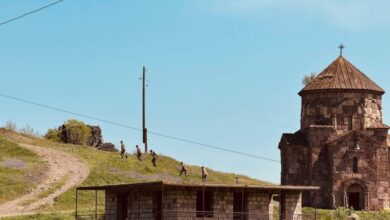100 bells ring at Kumkapi Patriarchal Church on Armenian Remembrance Day
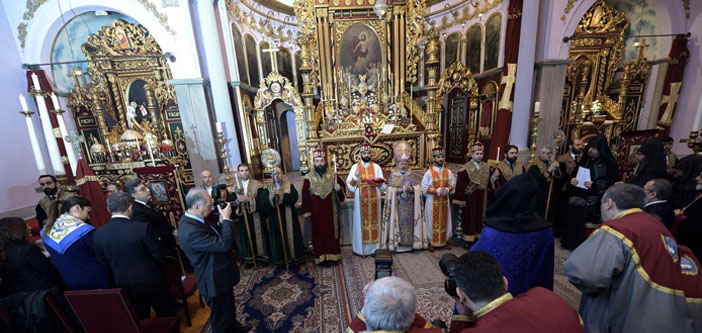
White doves of peace were released and messages of empathy and condolences were relayed to Armenians by Ankara at the Patriarchate of Turkey’s Armenians inIstanbul on April 24 at a liturgy to honor those who died during the 1915 events,Yonca Poyraz-Dogan writes in an articles published by Today’s Zaman.
Ahead of the centenary, Ankara became angry when the Pope and the European Parliament called the killings genocide. On Wednesday, Turkey called a similar declaration by the Austrian parliament outrageous and said no one should “lecture others on history.”
However, the event at Virgin Mary Church was full of peaceful messages. At the mass, Acting Patriarch Aram Ateşyan told about a thousand attendees — including EU Affairs Minister Volkan Bozkır, who stayed inside almost until the end of the
ceremony — that World War I, and especially the 1915 pages of history, are full of pain.
“Our people’s children lost their lives on the roads of deportation and in other places as a result of a cruel politics, and suffered a lot. It is their memory that had us gather here,” he said.
“Turkey’s Armenians are an inseparable and loyal part of this country, and they are fully aware of their citizenship responsibilities. […] We are agonized that this pain and sizzling wound has been emphasized only after 100 years. Nobody should expect that we should feel joyful about our situation today without remembering our past experiences. Everybody has a right to say anything within the limits of freedom of expression. Many states support our wounded people in the name of justice. But, our agony would be doubled if our pain has been used as a tool in politics,” he added.
Archibishop Ateşyan also prayed for the “soldiers of the Ottoman Army” who lost their lives in the Dardannelles War and extended his gratitude for the attendance of all Foreign Ministry officials, religious leaders and foreign diplomats — among them Greek Orthodox Ecumenical Patriarchate Bartholomew, Turkey’s Chief Rabbi Ishak Haleva and diplomats from the American, British, French and German consulates.
Following Archibishop Ateşyan’s sermon, Archbishop Tatul Anuşyan read President Recep Tayyip Erdoğan’s message in which Erdoğan extended his condolences to the children and grandchildren of the Ottoman Armenians.
“We know the sad events that Armenian society went through in the past and I want to repeat that we sincerely share your pain. I would like you to know that our hearts are wide open to the grandchildren of Ottoman Armenians all over the world,” said Erdoğan, who had extended his condolences to the Armenians last year as well.
In his message, Erdoğan also commemorated all Ottoman citizens, “whatever their ethnic and religious identity,” who lost their lives “in similar circumstances.”
Then, white doves of peace were released inside the church.
Ottoman authorities rounded up several hundred Armenian intellectuals in İstanbul on April 24, 1915, marked by the Armenians as the “Meds Yeghern” (Great Catastrophe), in a series of mass killings and deportations directed by authorities who believed the empire’s ethnic Armenians might be conspiring with wartime enemies.
Turkey accepts that many Armenians died in partisan fighting during World War I but denies that the killings amounted to genocide, arguing rather that they occurred as part of a larger conflict that took the lives of Ottoman citizens of various ethnic and religious backgrounds.
Before the commemoration, Bozkır told journalists that Turks and Armenians have a common history.
“It’s not correct to reduce the shared history of Turks and Armenians to events that took place 100 years ago. We desire to have the events of World War I be investigated. Then, we will be able to look at a common history,” he said.
“We respect the pain that our Armenian brothers and sisters went through. We consider those events bad. Therefore, we are not against any commemoration of the pains that were lived. We felt obligated to join the memorial service. We have to leave behind what happened 100 years ago and look to the future,” he added.
Armenian attendees of the mass lit hundreds of candles and joined the church choir in singing hymns.
Arsin Arşık, a retired university professor whose grandparents fought in the Dardanelles, said that the symbolic number of years is not important.
“Pains get reduced if they are shared. There is a common pain. Fifty or 100 years, these are symbolic. The important thing is to share the pain. We all know what happened,” he said.
A woman who was weeping on a church bench at the end of the memorial was upset because she was not able to make it for the liturgy.
“This was because I was driven to other places when I told the taxi driver that I was going to the church to pray,” said Gülüm Gümüş Akkaya, a recently retired high school mathematics teacher. “But I will stay here for a while for the father of my father who was killed in 1915-1916. He was from Harput, Elazığ in eastern Anatolia.”
An elderly woman at the church said that she is pleased with the attention that the mass received. She said reporters asked her many questions about history and the importance of the day.
In reference to the unease about using the world “genocide” in Turkey, she said: “Please write, ‘they were deported.’ What happened, happened. Today is a nice day. We commemorate our losses and it is very nice that the president expressed his condolences and officials were here.”


